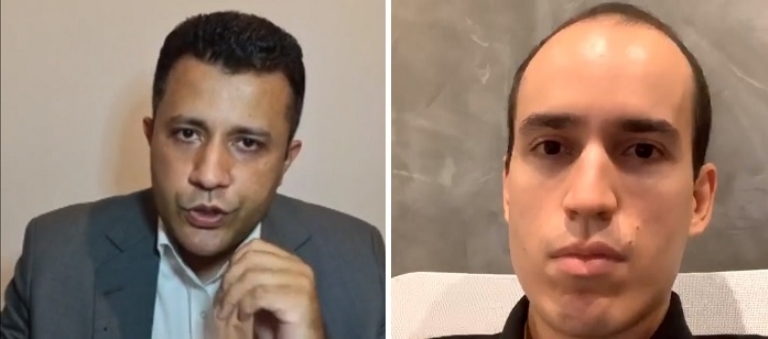

At the opening of the Live, Maia defined the issue of gaming, highlighting the growth of the activity from the development of software and platforms in recent years in Brazil, explaining that the use can be both recreational and professional, as is the case with eSports. “Today, poker is one of the most established modalities in Brazil because it has been recognized as a game of skill. And we also have games of chance, in which success depends exclusively on luck,” he explained.
Fernando Xavier commented that “there are currently more than 75 million players in eSports, which places Brazil among the three largest markets in the world in the segment. There are a multitude of things that define this activity and a great impact on legal issues to be understood.”
Maia explained that Brazil is seen worldwide as the great market to be explored, followed by China and Russia. “For geopolitical reasons, it will be very difficult to approve a legal framework for gaming in these two countries, unlike Brazil, which is taking important steps towards regulating the activity. We are ready to open since a long time ago. In 2018 we approved sports betting and only the regulation is missing, which is in the hands of the BNDES and the Ministry of Economy and soon we will have news,” he says.

According to him, “even before the regulation, we already have more than 60% of football teams today sponsored by sports betting companies. It is a giant and very interesting market and needs to be regulated for Brazil to start collecting taxes on the activity.”
According to Maia, an interesting data concerns poker, which does not need regulation. “Today, a gambling license is not necessary to open a poker house, only a permit from the City Hall. There was a discussion about the taxation of poker and in the middle of this year there was an interesting decision. Until then, the ISS was taxed on the buy-in, the registration. But it is divided into two parts, one for the award and the other for the event organizer. In court, even in the first instance, it was understood that taxation should be on the part that remains for the organizer.”
Xavier said the market is huge and asked Maia to report how a lawyer with an interest in this area can join the activity. The founding partner of FYMSA said that it is essential that all professionals master the English language, since most companies are large international firms. “In addition, it is very important to know details about the modalities. If you want to join poker, you need to know the rules and terms. This goes for other verticals. When I became interested in casinos, I took a casino regulation course in Las Vegas and one of the classes is about the rules of each game, which is given to dealers. They teach regulation, rules and fraud prevention,” he exemplified.
Asked about the regulation of casinos in Brazil, Maia said that this year, due to the pandemic and the need to raise funds, in addition to the possibility of reinvigorating tourism, the matter has regained strength and is now viewed with sympathy by the government. “I am in favor of legalizing not only casinos, but all types of games. They exist and illegality only interests those who make money from gambling without rules. The ban was not effective in Brazil,” he said.
Focusing on eSports, Maia said that it is a sector that has a huge horizon to be explored. “I can't see anything like that, as eSports are starting and the potential for growth is huge. It is not possible to imagine what will happen in ten years.”
In this sense, Xavier commented that what is seen today is a major impact on the economy and how common it will be to see eSports teams needing legal advice. “Professionalization will require this, and lawyers must be prepared for this great blue ocean.”
Maia agreed, saying that the activity will require demands in many areas, such as sports law and all that it involves, corporate, tax and image rights, for example.
Regarding lotteries, Maia explained to the audience the STF decision that ended the federal government's monopoly for the operation of lotteries, allowing states to explore the activity, “which will be impactful and will generate the growth of this segment across the country. Even sports betting may be under the umbrella of the states.”
According to the lawyer, there are still many issues under discussion by the STF, such as what concerns taxation, as well as a process that is under the report of Minister Luiz Fux, which deals with the unconstitutionality of article 50 of the law on criminal misdemeanors. "If it is understood that this article was not accepted by the 1988 Constitution, then everything will be allowed," he says.
For Maia, one cannot think in Brazil, with the regulation of casinos, of creating something similar to Las Vegas. “This is not possible, as the Las Vegas model is unique, and it was only possible to replicate in Macau due to its proximity to China and its strategic location in Asia. In Brazil, we have a geographical condition that does not help. We are at least 8 or 9 hours by plane from rich countries and around us we have several countries with regulated casinos. In addition, we have a very large territory and the decision for casinos should take into account the country and not in a specific region,” he explains.
In his assessment, Brazil should consider a mixed model. “We cannot think of a large resort with a casino, equipped with a hotel with five thousand rooms, it can work very well for São Paulo, but it wouldn't fit for Sergipe, for example. The government must think of the country with each of its peculiarities,” he concluded.
Source: GMB